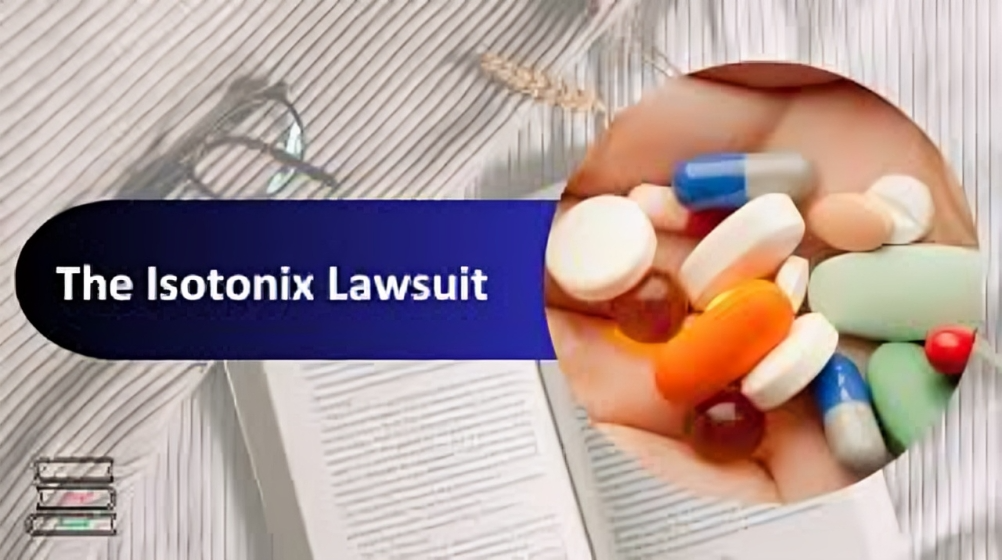
Isotonix Lawsuit Explained Key Facts and Potential Implications
The Isotonix lawsuit has been a topic of discussion among consumers, legal experts, and those involved in the health and wellness industry. Known for its line of dietary supplements and multivitamins sold through a direct sales model, Isotonix has cultivated a significant following over the years. However, the recent lawsuit has cast a shadow over its reputation, prompting many to question the company’s operations, claims, and compliance with legal and regulatory standards.
This article takes an in-depth look at the Isotonix lawsuit, including its roots, the legal claims at its core, the parties involved, and the possible ramifications for both the company and its stakeholders.
What Is Isotonix?
First, it’s vital to understand what Isotonix is and how the company operates. Isotonix is a product line under the parent company Market America, which was founded in 1992 by JR and Loren Ridinger. Market America is a multilevel marketing (MLM) company that distributes dietary supplements, vitamins, and wellness products, with Isotonix being one of its most prominent offerings.
Isotonix products are marketed as advanced nutritional supplements. They are sold as powders that consumers mix with water to form what the company claims are “isotonic solutions.” According to Isotonix, these solutions are absorbed more efficiently by the body compared to traditional supplements in pill form, making them unique in the market.
The company operates through a direct sales business model, meaning most of its products are sold by their independent distributors. These distributors earn commissions by selling Isotonix products and recruiting others into the program, making the model controversial in certain circles. Such controversy has played a part in the legal challenges the company now faces.
Background of the Isotonix Lawsuit
The Isotonix lawsuit emerged from concerns about the company’s business practices, particularly those tied to its marketing and sales approach. A significant point of contention is the MLM structure used by Market America, which distributes Isotonix products. Some critics allege that the company operates similarly to a pyramid scheme — a business model infamous for its unsustainable reliance on recruitment rather than actual product sales.
While many multilevel marketing businesses walk the fine line between a legitimate network sales model and a pyramid scheme, Isotonix has faced more specific allegations. The recent lawsuit accuses Market America of misleading claims about the potential earnings of distributors, as well as misrepresenting the efficacy of the Isotonix product line.
Regulatory bodies such as the Federal Trade Commission (FTC) have increased scrutiny of MLM practices in recent years, and the lawsuit directed at Isotonix ties into this broader movement. The legal claims argue that some of Market America’s promises to distributors and customers are unsubstantiated and even deceptive, violating fair business practice laws in the United States.
Legal Claims in the Isotonix Lawsuit
The Isotonix lawsuit touches on several legal claims, making the situation complex and multi-faceted. Below are the primary legal issues raised in the lawsuit:
1. Allegations of a Pyramid Scheme
At the core of the lawsuit is the accusation that Market America, the parent company of Isotonix, operates as a pyramid scheme. A pyramid scheme typically involves participants making money primarily by recruiting new members rather than through the sale of legitimate products or services. While Isotonix distributors are encouraged to sell its supplement products, critics argue that the focus of its business model is more heavily on recruitment.
The lawsuit claims that most distributors who join the Isotonix program end up losing money because the revenue-generating opportunity isn’t tied to actual consumer demand for the products. This aligns with broader criticisms of MLM practices, which often result in financial losses for the majority of participants.
2. Misleading Earnings Claims
One of the most significant points of contention in the Isotonix lawsuit is the alleged misrepresentation of potential earnings. Market America markets the Isotonix opportunity as a way to generate substantial income, often highlighting success stories of top earners in the program. However, the lawsuit claims that most distributors earn little to no profit, with many incurring losses due to ongoing purchases of products and marketing materials.
The lawsuit argues that Market America has a responsibility to provide accurate representations of earnings potential, ensuring transparency for those looking to join the Isotonix sales program under fair expectations.
3. False Advertising of Product Efficacy
Another critical issue in the Isotonix lawsuit involves the claims made about the effectiveness of their products. Isotonix markets its supplements as highly bioavailable due to their isotonic form. The company suggests that its products can deliver superior results compared to traditional vitamins, with faster absorption and enhanced benefits.
The lawsuit questions whether these claims are substantiated with scientific evidence. It argues that the marketing language may be misleading, potentially violating consumer protection laws regarding health product advertising.
4. Breach of Consumer Trust
Consumers and distributors involved in the lawsuit assert that Market America breached their trust by prioritizing recruitment over the actual value and efficacy of its Isotonix products. By focusing primarily on bringing in more distributors — who are then encouraged to purchase Isotonix products in bulk — the lawsuit alleges that Market America’s practices exploit their sales network rather than serve their customers with high-quality, effective supplements.
Parties Involved
The Isotonix lawsuit includes several key players:
- Market America and Its Leadership
JR Ridinger, the founder and CEO of Market America, is among the individuals named in the lawsuit as being responsible for the company’s business practices. Other members of Market America’s leadership team are also involved in defending the allegations. - Former Distributors
Some former Isotonix distributors have come forward in the lawsuit, sharing their experiences of financial losses and disillusionment with the business model. These testimonials play a significant role in the legal proceedings. - Regulators and Consumer Advocacy Groups
Entities like the FTC, which have taken steps to regulate MLM companies more strictly in recent years, may also have an interest in the outcome of the Isotonix lawsuit. Consumer advocacy groups have similarly voiced concerns about transparency and consumer rights in the dietary supplement market.
Potential Implications of the Lawsuit
The outcome of the Isotonix lawsuit could have far-reaching effects for both Market America and the broader direct sales industry. Here are some potential implications to consider:
1. Increased Regulation of MLM Companies
If the lawsuit leads to findings against Isotonix or Market America, regulators could take stronger actions to oversee other MLM companies. Tighter restrictions on recruitment-based sales models and requirements for transparency in earnings claims could follow.
2. Higher Standards for Product Advertising
Lawsuits like this often serve as wake-up calls for companies to re-evaluate their product claims. If Isotonix’s product efficacy claims are found to be unsupported, it could usher in stricter standards across the entire health and wellness sector regarding evidence-based advertising.
3. Financial and Reputational Impact on Market America
Regardless of the legal outcome, the Isotonix lawsuit could tarnish Market America’s reputation. Distributors, potential recruits, and customers may begin to question the company’s ethics, leading to a potential decline in sales and recruiting efforts.
4. Consumer Awareness
Finally, the lawsuit shines a spotlight on MLM practices, encouraging consumers and potential distributors to approach such business opportunities with heightened caution. This shift in consumer awareness could reduce the prevalence of questionable business models in the long term.
Final Thoughts
The Isotonix lawsuit highlights significant issues surrounding transparency, ethics, and responsibility in the MLM world. For Isotonix, the legal battle poses challenges not only to their reputation but also to the credibility of their products and business practices.
Regardless of the outcome, the lawsuit serves as a reminder of the importance of robust consumer protections and the need for accountability in marketing and selling wellness products. As the details of the case unfold, both consumers and business leaders are likely to learn valuable lessons about ethics and compliance in the fast-evolving health industry.



